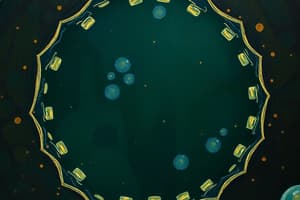Podcast
Questions and Answers
What is the primary function of cell cycle checkpoints?
What is the primary function of cell cycle checkpoints?
- To repair DNA damage before cell division
- To regulate the production of cyclins and CDKs
- To ensure proper progression through each stage of the cell cycle (correct)
- To initiate cell division at the appropriate time
Which of the following is NOT one of the three main checkpoints during prophase?
Which of the following is NOT one of the three main checkpoints during prophase?
- G1/S checkpoint (correct)
- Metaphase checkpoint
- Anaphase/telophase checkpoint
- Interphase checkpoint
What is the primary function of cyclin-dependent kinases (CDKs)?
What is the primary function of cyclin-dependent kinases (CDKs)?
- To facilitate the transition between different phases of the cell cycle (correct)
- To repair DNA damage before cell division
- To facilitate DNA replication during the S phase
- To regulate the production of cyclins
What is the role of cyclins in the regulation of the cell cycle?
What is the role of cyclins in the regulation of the cell cycle?
Which of the following is a potential consequence of interruptions during the cell cycle?
Which of the following is a potential consequence of interruptions during the cell cycle?
What is one of the conditions that cells monitor before entering mitosis?
What is one of the conditions that cells monitor before entering mitosis?
What is the primary function of p53 in the cell cycle?
What is the primary function of p53 in the cell cycle?
In response to DNA damage, what is the role of p21 in the cell cycle?
In response to DNA damage, what is the role of p21 in the cell cycle?
Which cyclin is responsible for promoting entry into mitosis?
Which cyclin is responsible for promoting entry into mitosis?
What happens when cells encounter DNA damage regarding p21 and CDK activation?
What happens when cells encounter DNA damage regarding p21 and CDK activation?
Which CDK inhibitor prevents the activation of cyclinD-CDK4/6 during post-mitotic cell arrest?
Which CDK inhibitor prevents the activation of cyclinD-CDK4/6 during post-mitotic cell arrest?
What happens if p53 is mutated or absent in a cell?
What happens if p53 is mutated or absent in a cell?
Study Notes
Cell Cycle Checkpoints
The cell cycle is a sequence of events that occurs within a cell leading to its division into two identical daughter cells. It consists of four distinct phases: G1 phase, S phase, G2 phase, and mitosis. Interruptions during these stages can lead to genomic instability, cancer development, and other diseases. To maintain proper control over the cell cycle process, cells have evolved several mechanisms known as checkpoints to ensure appropriate progression through each stage. These regulatory systems prevent potentially harmful cycles from proceeding further.
There are various types of checkpoint controls throughout the cell cycle. For instance, there are three main checkpoints during prophase: the interphase checkpoint, the metaphase checkpoint, and the anaphase/telophase checkpoint. After completing one round of DNA replication, the cell must ensure it has adequate nutrients and energy before entering mitosis. This is achieved by monitoring the status of cellular components such as DNA and protein levels, which if missing, force the cell to halt its progress until these conditions are met.
Cdk & Cyclins
Cyclin-dependent kinases (CDKs) play a crucial role in the regulation of the cell cycle. They are responsible for facilitating the transition between different phases of the cell cycle. CDKs function as heterodimers with cyclins, proteins that drive the activity of CDKs. Each cyclin-CDK complex has unique capabilities specific to the phase they regulate, ensuring proper timing of events within each stage. For example, cyclin A promotes entry into mitosis, while cyclin B controls the onset of M-phase progression.
Once activated, cyclin-CDK complexes phosphorylate numerous targets, altering their properties and thus driving cell cycle progression. When cells encounter DNA damage, the CDK inhibitor p21 is released, preventing the activation of cyclinE-CDK2 and thereby arresting cells in the G1 phase. Post-mitotic cells experience similar arrest through the action of p27, another CDK inhibitor that prevents cyclinD-CDK4/6 activation.
p53 and p21
p53 is a tumor suppressor protein that plays a critical role in maintaining genome stability and cell integrity. One of p53's primary functions is to regulate the cell cycle by controlling the expression of genes involved in growth suppression. When p53 detects DNA damage, it activates target genes like p21, leading to arrest in either the G1 or early S phase.
In response to stress signals or DNA lesions, p53 transcriptionally upregulates p21, causing a complete blockade of cell cycling. As mentioned earlier, p21 suppresses cell cycle progression by binding to and inhibiting both cyclin D-CDK4/6 and cyclin E-CDK2. When p53 is mutated or absent, cells may escape this surveillance mechanism, promoting uncontrolled cell division and contributing to the development of cancer.
In summary, cell cycle regulation involves multiple mechanisms to ensure proper progression through each stage. By employing checkpoints and molecules such as cyclins, CDKs, p53, and p21, cells can monitor their internal processes and respond to external stimuli, ultimately preserving genetic information and preventing disease development.
Studying That Suits You
Use AI to generate personalized quizzes and flashcards to suit your learning preferences.
Description
Test your knowledge on the cell cycle, checkpoint controls, cyclin-dependent kinases, and tumor suppressor proteins involved in regulating cell division and maintaining genomic stability. Learn about the different phases of the cell cycle, the role of CDKs and cyclins in cell cycle progression, and how p53 and p21 contribute to controlling cell proliferation. Explore the importance of checkpoints in preventing errors during cell division and the consequences of dysregulation.




